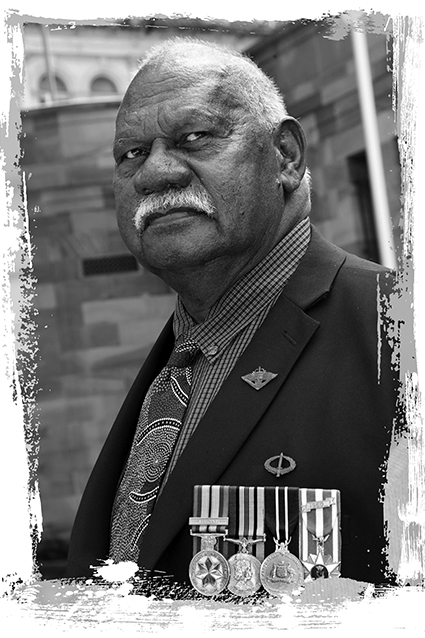Vern Hopkins
Mardigan Bidjara
Private (retired)
2nd Battalion, Royal Australian Regiment
Royal Australian Infantry Corps
Australian Army
Vietnam Veteran
Medals
Australian Active Service Medal 1945-75 with clasp Vietnam
Vietnam Medal
Australian Defence Medal
Republic of Vietnam Campaign Medal
Infantry Combat Badge
Returned from Active Service Badge
I was born in Rockhampton, Queensland in 1950, the youngest of nine. My Mob is Mardigan on Dad’s side, and Bidjara on Mum’s. They couldn’t afford to send me to high school so I left when I was 13 and worked farming and cane-cutting. I came down to Brisbane in 1967, and signed up to do three years in the Army when I was 17. I probably joined because Dad was in WW2, and my brothers and cousins also served. After training at Kapooka, I was posted to 2nd Battalion, Royal Australian Regiment (2 RAR) infantry in Townsville and deployed to Vietnam in May 1970. I was made forward scout because they reckoned black trackers had good eyesight. Apart from a couple of remarks like that I never experienced racism in the army. In war you have to have each other’s backs. I was treated as an equal in the army but when we came back – we still weren’t allowed into pubs or RSL’s whether in uniform or not.
The memories of Vietnam that really got to me were the children. When we went into a village you’d see the fear in their eyes. We’d give them our WW2 chocolate to bring a smile to their faces. At Christmas, we went to an orphanage to give the children presents. They all had missing limbs, napalm scars or were blind. I’m still affected by that, even today – can’t bear children crying or watching Smith Family ads on TV.
Mum passed away a month after I returned from Vietnam. They said the only reason she’d hung around was to see her baby come home. Then, my 3 years up, I left the Army, and did labouring work. In 1987, I trained to become a field officer with the Aboriginal Legal Service. Our area stretched from Coolangatta to the Sunshine Coast. We built up good rapport with the community including police, magistrates and shopkeepers. Our work included the Supreme Court, steering committees and the Aboriginal Welfare Fund. Out of all this came what was to be my passion and my forte – Human Rights. I still get called upon to advise reference groups. When I first joined the Black Rights movement the focus had been on Land Rights, but to me now it’s all about Human Rights and the stories I hear from my own people and from people all over the world – horrendous stories of what’s happened to them, it’d make you cry. I’ve been to 3 World conferences on Racism now, the first in Wollongong, NSW, then over in Korea, and in 2000, at Durban in South Africa.
I started Vietnam Veterans counselling because of anger. People told me I needed help but I was in denial about PTSD. But not long after I was assigned to the defence in a case involving murder and rape of children and I began to revisit my time in Vietnam. So at 52 I retired due to PTSD, received my pension, and did part-time security for events including Suncorp Stadium. I still revisit those children in Vietnam, even now, and the only reason I’m as good as I am today is because of the wonderful medical team around me.
On Anzac day, I’ll wear my medals. Not to show people where I was; I know where I was. I wear them in honour of my Dad and my Mum, and my brothers and cousins, and for all the fallen, especially my mates that I lost over in Vietnam. I always stand proud. I love my time in the army. It gave me discipline, and self-esteem… and mateship, yeah, I think that’s what I cherish the most, the camaraderie with my mates. I know I did my job and I never let anybody down. I know the blokes behind me did their job too. They never let me down. And that’s what you take out it.
